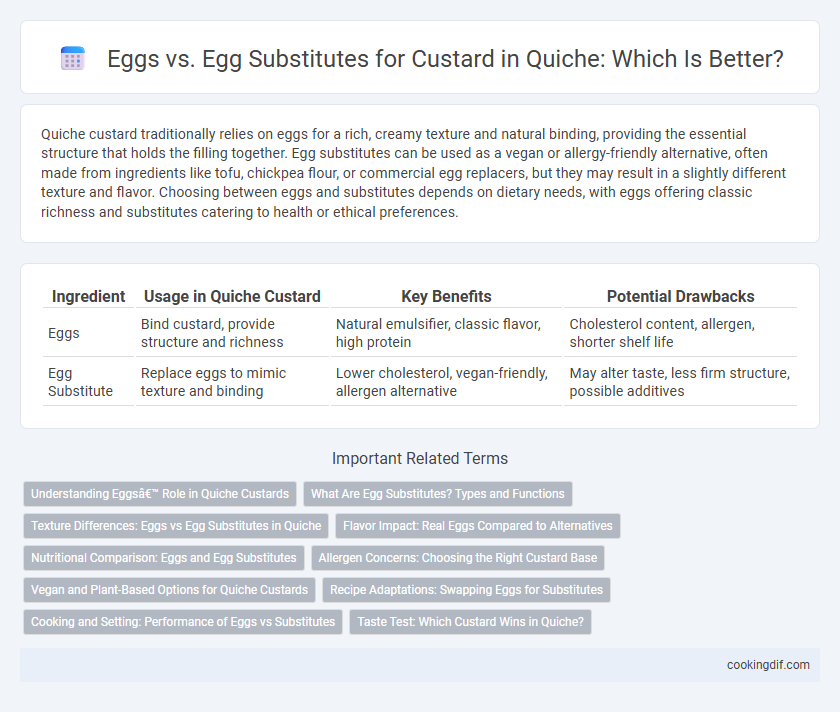Quiche custard traditionally relies on eggs for a rich, creamy texture and natural binding, providing the essential structure that holds the filling together. Egg substitutes can be used as a vegan or allergy-friendly alternative, often made from ingredients like tofu, chickpea flour, or commercial egg replacers, but they may result in a slightly different texture and flavor. Choosing between eggs and substitutes depends on dietary needs, with eggs offering classic richness and substitutes catering to health or ethical preferences.
Table of Comparison
| Ingredient | Usage in Quiche Custard | Key Benefits | Potential Drawbacks |
|---|---|---|---|
| Eggs | Bind custard, provide structure and richness | Natural emulsifier, classic flavor, high protein | Cholesterol content, allergen, shorter shelf life |
| Egg Substitute | Replace eggs to mimic texture and binding | Lower cholesterol, vegan-friendly, allergen alternative | May alter taste, less firm structure, possible additives |
Understanding Eggs’ Role in Quiche Custards
Eggs provide essential structure, richness, and binding properties crucial for a smooth, creamy quiche custard, setting it apart from egg substitutes which often lack the same coagulation and emulsification abilities. They create a delicate, tender texture by coagulating proteins that trap air, giving quiche its signature light yet firm consistency. While egg substitutes can offer allergies or dietary accommodations, they may result in a less stable custard, compromising the quiche's traditional silky mouthfeel and structural integrity.
What Are Egg Substitutes? Types and Functions
Egg substitutes for quiche custard include silken tofu, soy flour blends, and commercial egg replacers like Ener-G or Bob's Red Mill, each providing binding and moisture without eggs. These alternatives function by mimicking the coagulation and emulsifying properties of eggs, ensuring the custard sets properly while catering to dietary restrictions such as vegan or allergen-free needs. Opting for egg substitutes affects the texture and flavor profile, with tofu offering creaminess and commercial replacers maintaining structure and rise.
Texture Differences: Eggs vs Egg Substitutes in Quiche
Eggs create a rich, creamy texture in quiche custard due to their natural coagulation and protein structure, which firms up beautifully during baking. Egg substitutes often result in a denser or looser custard, lacking the same silkiness and elasticity, as they usually contain plant-based proteins or thickeners that do not mimic egg coagulation perfectly. The choice between eggs and substitutes significantly impacts the custard's mouthfeel, with eggs providing a traditional smoothness and egg substitutes sometimes yielding a slightly grainy or gummy texture.
Flavor Impact: Real Eggs Compared to Alternatives
Real eggs provide a rich, creamy texture and a depth of flavor that egg substitutes often cannot replicate in quiche custard. Egg substitutes tend to produce a lighter, sometimes more rubbery texture and can lack the natural umami and savory notes that eggs impart. Choosing real eggs enhances the overall taste profile, delivering a classic, satisfying quiche experience with fuller flavor complexity.
Nutritional Comparison: Eggs and Egg Substitutes
Eggs provide high-quality protein, essential vitamins like B12, and minerals such as selenium, making them a nutrient-dense choice for quiche custards. Egg substitutes, often made from plant-based ingredients or egg whites, typically offer lower cholesterol and fat content but may lack the complete amino acid profile found in whole eggs. Choosing between eggs and substitutes affects the nutritional profile, influencing protein levels, fat types, and micronutrient availability in the final quiche dish.
Allergen Concerns: Choosing the Right Custard Base
Eggs are a common allergen, prompting many to seek egg substitutes like silken tofu or chickpea flour for quiche custards, which provide a similar texture without triggering allergies. These alternatives offer protein and a smooth consistency essential for the custard's structure while catering to vegan or egg-intolerant diets. Selecting the right base ensures the quiche remains creamy and flavorful while addressing allergen concerns effectively.
Vegan and Plant-Based Options for Quiche Custards
Vegan and plant-based options for quiche custards often use silken tofu, chickpea flour, or blended cashews as egg substitutes to create a creamy and firm texture similar to traditional egg-based custards. These alternatives provide a rich source of plant proteins and maintain the quiche's structural integrity while enabling dairy-free and egg-free diets. Nutrient profiles in these substitutes vary, with chickpea flour offering high fiber and lower fat, while cashews contribute healthy fats and a smooth mouthfeel.
Recipe Adaptations: Swapping Eggs for Substitutes
Swapping eggs for substitutes in quiche custard demands careful selection to maintain texture and flavor; silken tofu, aquafaba, and commercial egg replacers each offer distinct binding and moisture properties. Silken tofu provides a creamy consistency closely mimicking eggs, while aquafaba contributes ideal aeration for a light, fluffy custard. Understanding protein content and moisture levels in substitutes is crucial for recipe adaptations to ensure a firm yet tender quiche filling.
Cooking and Setting: Performance of Eggs vs Substitutes
Eggs provide a natural structure and rich texture in quiche custard, coagulating during baking to create a firm but tender set. Egg substitutes, often based on starches or plant proteins, may result in a looser, less creamy consistency and can sometimes alter the quiche's sensitivity to temperature during cooking. For optimal custard performance, eggs ensure a reliable rise and smooth finish, while substitutes might require adjustments in baking time and temperature to achieve a comparable set.
Taste Test: Which Custard Wins in Quiche?
Egg-based custards in quiche deliver a rich, creamy texture with a classic, savory flavor that egg substitutes often struggle to match. While egg substitutes provide a cholesterol-free and vegan-friendly option, taste tests reveal they sometimes lack the depth and smoothness of traditional eggs. Culinary experts generally favor real eggs for their superior mouthfeel and flavor complexity in quiche custards.
eggs vs egg substitute for custard Infographic

 cookingdif.com
cookingdif.com